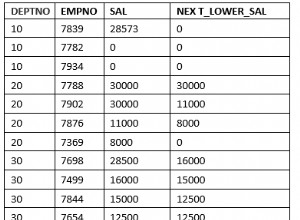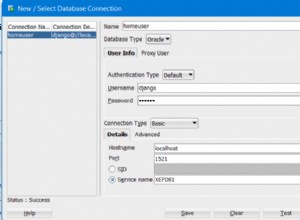Si necesitas el paso intermedio:
SELECT unnest(string_to_array(a, ' '))::float8
-- or do something else with the derived table
FROM unnest(string_to_array('3.584731 60.739211,3.590472 60.738030', ',')) a;
Esto es más detallado que regexp_split_to_table()
, pero aún puede ser más rápido porque las expresiones regulares suelen ser más caras. (Prueba con EXPLAIN ANALYZE .)
Primero me separé en ',' , y luego en ' ' - la secuencia inversa de lo que describes parece más adecuada.
Si es necesario, puede envolver esto en una función PL/pgSQL:
CREATE OR REPLACE FUNCTION public.split_string(_str text
, _delim1 text = ','
, _delim2 text = ' ')
RETURNS SETOF float8 AS
$func$
BEGIN
RETURN QUERY
SELECT unnest(string_to_array(a, _delim2))::float8
-- or do something else with the derived table from step 1
FROM unnest(string_to_array(_str, _delim1)) a;
END
$func$ LANGUAGE plpgsql IMMUTABLE;
O simplemente una función SQL:
CREATE OR REPLACE FUNCTION public.split_string(_str text
, _delim1 text = ','
, _delim2 text = ' ')
RETURNS SETOF float8 AS
$func$
SELECT unnest(string_to_array(a, _delim2))::float8
FROM unnest(string_to_array(_str, _delim1)) a
$func$ LANGUAGE sql IMMUTABLE;
Hazlo IMMUTABLE para permitir la optimización del rendimiento y otros usos.
Llamar (utilizando los valores predeterminados proporcionados para _delim1 y _delim2 ):
SELECT * FROM split_string('3.584731 60.739211,3.590472 60.738030');
O:
SELECT * FROM split_string('3.584731 60.739211,3.590472 60.738030', ',', ' ');
Más rápido
Para obtener el máximo rendimiento, combine translate()
con unnest(string_to_array(...)) :
SELECT unnest(
string_to_array(
translate('3.584731 60.739211,3.590472 60.738030', ' ', ',')
, ','
)
)::float8




